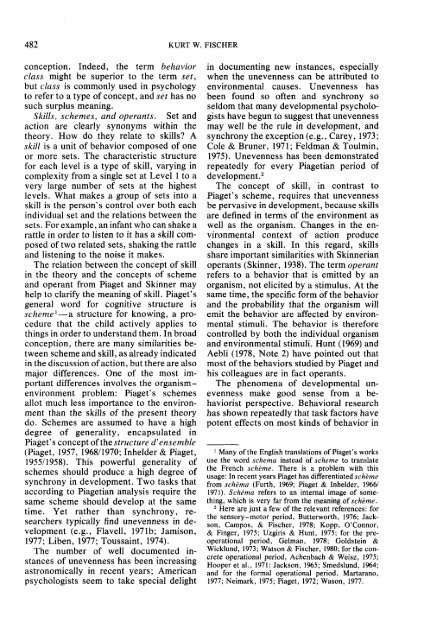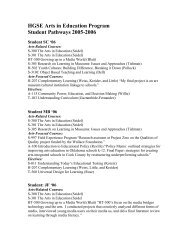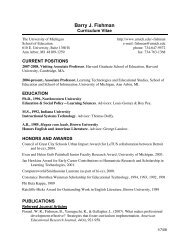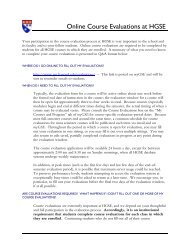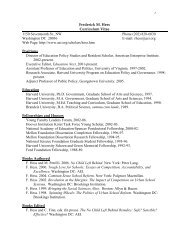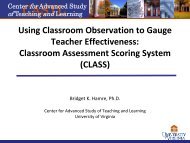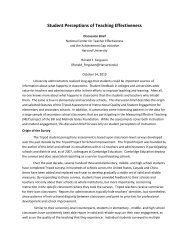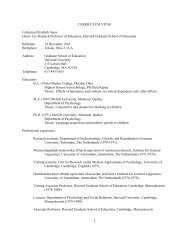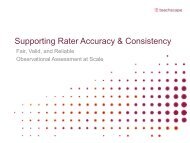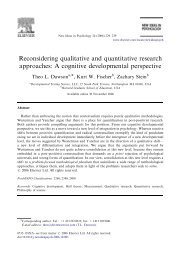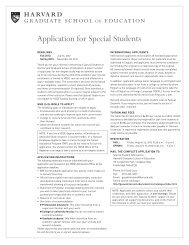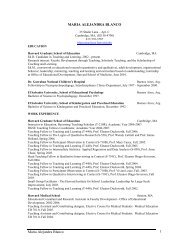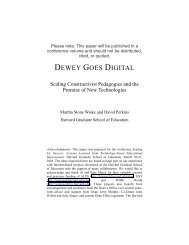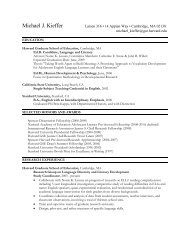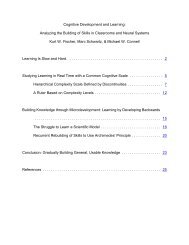Psychological Review - Harvard Graduate School of Education ...
Psychological Review - Harvard Graduate School of Education ...
Psychological Review - Harvard Graduate School of Education ...
Create successful ePaper yourself
Turn your PDF publications into a flip-book with our unique Google optimized e-Paper software.
482 KURT W. FISCHER<br />
conception. Indeed, the term behavior<br />
class might be superior to the term set,<br />
but class is commonly used in psychology<br />
to refer to a type <strong>of</strong> concept, and set has no<br />
such surplus meaning.<br />
Skills, schemes, and operants. Set and<br />
action are clearly synonyms within the<br />
theory. How do they relate to skills? A<br />
skill is a unit <strong>of</strong> behavior composed <strong>of</strong> one<br />
or more sets. The characteristic structure<br />
for each level is a type <strong>of</strong> skill, varying in<br />
complexity from a single set at Level 1 to a<br />
very large number <strong>of</strong> sets at the highest<br />
levels. What makes a group <strong>of</strong> sets into a<br />
skill is the person's control over both each<br />
individual set and the relations between the<br />
sets. For example, an infant who can shake a<br />
rattle in order to listen to it has a skill composed<br />
<strong>of</strong> two related sets, shaking the rattle<br />
and listening to the noise it makes.<br />
The relation between the concept <strong>of</strong> skill<br />
in the theory and the concepts <strong>of</strong> scheme<br />
and operant from Piaget and Skinner may<br />
help to clarify the meaning <strong>of</strong> skill. Piaget's<br />
general word for cognitive structure is<br />
scheme 1 —a structure for knowing, a procedure<br />
that the child actively applies to<br />
things in order to understand them. In broad<br />
conception, there are many similarities between<br />
scheme and skill, as already indicated<br />
in the discussion <strong>of</strong> action, but there are also<br />
major differences. One <strong>of</strong> the most important<br />
differences involves the organismenvironment<br />
problem: Piaget's schemes<br />
allot much less importance to the environment<br />
than the skills <strong>of</strong> the present theory<br />
do. Schemes are assumed to have a high<br />
degree <strong>of</strong> generality, encapsulated in<br />
Piaget's concept <strong>of</strong> the structure d'ensemble<br />
(Piaget, 1957, 1968/1970; Inhelder & Piaget,<br />
1955/1958). This powerful generality <strong>of</strong><br />
schemes should produce a high degree <strong>of</strong><br />
synchrony in development. Two tasks that<br />
according to Piagetian analysis require the<br />
same scheme should develop at the same<br />
time. Yet rather than synchrony, researchers<br />
typically find unevenness in development<br />
(e.g., Flavell, 1971b; Jamison,<br />
1977; Liben, 1977; Toussaint, 1974).<br />
The number <strong>of</strong> well documented instances<br />
<strong>of</strong> unevenness has been increasing<br />
astronomically in recent years; American<br />
psychologists seem to take special delight<br />
in documenting new instances, especially<br />
when the unevenness can be attributed to<br />
environmental causes. Unevenness has<br />
been found so <strong>of</strong>ten and synchrony so<br />
seldom that many developmental psychologists<br />
have begun to suggest that unevenness<br />
may well be the rule in development, and<br />
synchrony the exception (e.g., Carey, 1973;<br />
Cole & Bruner, 1971; Feldman & Toulmin,<br />
1975). Unevenness has been demonstrated<br />
repeatedly for every Piagetian period <strong>of</strong><br />
development. 2<br />
The concept <strong>of</strong> skill, in contrast to<br />
Piaget's scheme, requires that unevenness<br />
be pervasive in development, because skills<br />
are defined in terms <strong>of</strong> the environment as<br />
well as the organism. Changes in the environmental<br />
context <strong>of</strong> action produce<br />
changes in a skill. In this regard, skills<br />
share important similarities with Skinnerian<br />
operants (Skinner, 1938). The term operant<br />
refers to a behavior that is emitted by an<br />
organism, not elicited by a stimulus. At the<br />
same time, the specific form <strong>of</strong> the behavior<br />
and the probability that the organism will<br />
emit the behavior are affected by environmental<br />
stimuli. The behavior is therefore<br />
controlled by both the individual organism<br />
and environmental stimuli. Hunt (1969) and<br />
Aebli (1978, Note 2) have pointed out that<br />
most <strong>of</strong> the behaviors studied by Piaget and<br />
his colleagues are in fact operants.<br />
The phenomena <strong>of</strong> developmental unevenness<br />
make good sense from a behaviorist<br />
perspective. Behavioral research<br />
has shown repeatedly that task factors have<br />
potent effects on most kinds <strong>of</strong> behavior in<br />
1 Many <strong>of</strong> the English translations <strong>of</strong> Piaget's works<br />
use the word schema instead <strong>of</strong> scheme to translate<br />
the French scheme. There is a problem with this<br />
usage: In recent years Piaget has differentiated scheme<br />
from schema (Furth, 1969; Piaget & Inhelder, 1966/<br />
1971). Schema refers to an internal image <strong>of</strong> something,<br />
which is very far from the meaning <strong>of</strong> scheme.<br />
2 Here are just a few <strong>of</strong> the relevant references: for<br />
the sensory-motor period, Butterworth, 1976; Jackson,<br />
Campos, & Fischer, 1978; Kopp, O'Connor,<br />
& Finger, 1975; Uzgiris & Hunt, 1975; for the preoperational<br />
period, Gelman, 1978; Goldstein &<br />
Wicklund, 1973; Watson & Fischer, 1980; for the concrete<br />
operational period, Achenbach & Weisz, 1975;<br />
Hooper et al., 1971; Jackson, 1965; Smedslund, 1964;<br />
and for the formal operational period, Martarano,<br />
1977; Neimark, 1975; Piaget, 1972; Wason, 1977.


